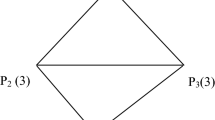Abstract
The article introduces recursive ontology, a general ontology which aims to describe how being is organized and what are the processes that drive it. In order to answer those questions, I use a multidisciplinary approach that combines the theory of levels, philosophy and systems theory. The main claim of recursive ontology is that being is the product of a single recursive process of generation that builds up all of reality in a hierarchical fashion from fundamental physical particles to human societies. To support this assumption, I provide the general laws and the basic principles of recursive ontology as well as a semi-formalised model of the theory based on a recursive generative grammar. Recursive ontology not only actively promotes a multidisciplinary investigation of reality, but also can be used as a general framework to develop future domain-specific theories.



Similar content being viewed by others
References
Ahl V, Allen TF (1996) Hierarchy theory: a vision, vocabulary and epistemology. Columbia University Press, New York
Allen TF, Starr TB (1982) Hierarchy: perspectives for ecological complexity. University of Chicago Press, Chicago
Austin D (1969) The theory of integrative levels reconsidered as the basis of a general classification: classification and information control/Classification Research Group. Library Association, London, pp 81–95
Backlund A (2000) The definition of system. Kybernetes 29(4):444–451
Brown R, Glazebrook JF, Baianu IC (2007) A conceptual construction of complexity levels theory in spacetime categorical ontology: non-abelian algebraic topology, many-valued logics and dynamic systems. Axiomathes 17(3–4):409–493
Capra F (1996) The web of life: a new scientific understanding of living systems. Random House LLC, New York
Chomsky N (1956) Three models for the description of language. IRE Trans Inform Theory 2(3):113–124
Chomsky N (1991) Linguistics and cognitive science: problems and mysteries. In: Kasher A (ed) The Chomskyan turn. Blackwell, Hoboken
Chomsky N (2002) Syntactic structures. Walter de Gruyter, Berlin
Corballis MC (2007) Recursion, language, and starlings. Cogn Sci 31(4):697–704
Corballis MC (2011) The recursive mind: the origins of human language, thought, and civilization. Princeton University Press, Princeton
Dawkins R (1999) The extended phenotype: the long reach of the gene. Oxford University Press, Oxford
Dawkins R (2006) The selfish gene. Oxford University Press, Oxford
Evans N, Stephen CL (2009) The myth of language universals: language diversity and its importance for cognitive science. Behav Brain Sci 32(5):429–448
Everett DL (2009) Pirahã culture and grammar: a response to some criticisms. Language 85(2):405–442
Feibleman JK (1954) Theory of integrative levels. Br J Philos Sci 5(17):59–66
Fitch WT (2010) Three meanings of ‘recursion’: key distinctions for biolinguistics. In: Larson RK, Deprez V, Yamakido H (eds) The evolution of human language. Cambridge University Press, Cambridge
Fodor JA (1983) The modularity of mind: an essay on faculty psychology. MIT Press, Cambridge
Grossmann R (1983) The categorial structure of the world. Indiana University Press, Bloomington
Hartmann N (2012) New ways of ontology. Transaction Publishers, Piscataway
Hauser MD, Chomsky N, Fitch WT (2002) The faculty of language: what is it, who has it, and how did it evolve? Science 298(5598):1569–1579
Hofstadter DR (1980) Goedel, Escher, Bach: an eternal golden braid. Penguin, London
Jan SB (2007) The memetics of music: a neo-Darwinian view of musical structure and culture. Ashgate Publishing, Farnham
Korn J (2007) Systems view, emergence and complexity. Kybernetes 36(5/6):776–790
Koschmann T (2010) On the universality of recursion. Lingua 120(12):2691–2694
Luhmann N (1995) Social systems. Stanford University Press, Redwood
Mandelbrot BB (1983) The fractal geometry of nature. Macmillan, London
Martins MJ, Fitch WT (2014) Investigating recursion within a domain-general framework. In: Lowenthal F, Lefebvre L (eds) Language and recursion. Springer, New York
Minati G, Pessa E, Abram MR (eds) (2006) Systemics of emergence: research and development. Springer, New York
Minsky M (1988) Society of mind. Simon and Schuster, New York
Nicolescu B (2002) Manifesto of transdisciplinarity. Suny, Albany
Nicolis G, Prigogine I (1977) Self-organization in nonequilibrium systems. Wiley, Hoboken
Novikoff AB (1945) The concept of integrative levels and biology. Science 101(2618):209–215
Pattee HH (ed) (1973) Hierarchy theory: the challenge of complex systems. Braziller, New York
Pinker S, Jackendoff R (2005) The faculty of language: what’s special about it? Cognition 95(2):201–236
Poli R (1998) Levels. Axiomathes 9(1–2):197–211
Poli R (2001) The basic problem of the theory of levels of reality. Axiomathes 12(3):261–283
Poli R (2009) Two theories of levels of reality. In dialogue with Barsab Nicolescu. Transdiscipl Sci Relig 6:135–150
Progogine I, Stengers I (1984) Order out of chaos: man’s new dialogue with nature. Bantam Books, New York
Salthe SN (1985) Evolving hierarchical systems: their structure and representation. Columbia University Press, New York
Simon HA (1991) The architecture of complexity. Springer, New York
von Bertalanffy L (1968) General system theory: foundations, development, applications. Braziller, New York
Author information
Authors and Affiliations
Corresponding author
Rights and permissions
About this article
Cite this article
Velardo, V. Recursive Ontology: A Systemic Theory of Reality. Axiomathes 26, 89–114 (2016). https://doi.org/10.1007/s10516-015-9272-0
Received:
Accepted:
Published:
Issue Date:
DOI: https://doi.org/10.1007/s10516-015-9272-0




